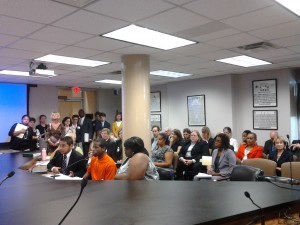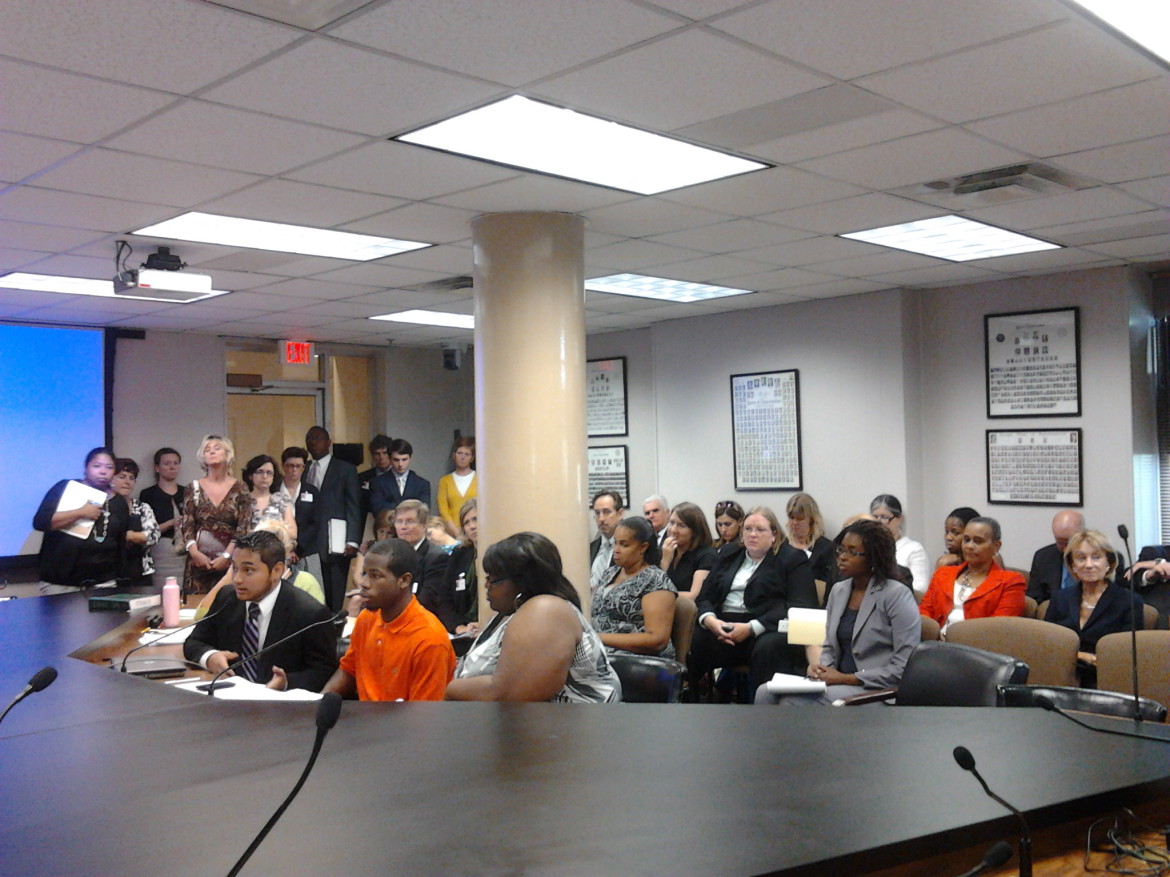
Former foster children speak before Georgia House Judiciary Committee members.
The stakeholder organizations involved in Georgia’s Juvenile Code Rewrite legislation are still providing input for the sweeping revision of the state’s 40-year-old juvenile law.
Representatives from a diverse array of child welfare organizations shared their respective views on HB 641 at a standing-room only hearing before House Judiciary Committee members Thursday.
Overwhelming support for the effort – now roughly seven years in the making – was repeatedly voiced during the two-hour gathering at the state capitol, along with critical suggestions for improvement. The rewrite has received commitments from Gov. Nathan Deal and Georgia House and Senate leadership to ready the measure for a vote in the 2012 legislative session.
“I think we’re finding out that a lot of people have concerns and they’re coming together to make this a good piece of legislation,” says committee chairman Rep. Wendell Willard (R- Sandy Springs), of the presentations made by organizations such as the Georgia Division of Family and Children Services, Court Appointed State Advocate (CASA) and Interfaith Children's Movement. “It was very encouraging to me. Hopefully by January we will have a bill that is ready to move forward.”
Kirsten Widner, policy director for the Emory University School of Law’s Barton Child Law and Policy Center says she was pleased with the outcome of the hearing and one held earlier in the week.
“I’m so pleased to see the excitement of the stakeholders,” says Widner, who has been instrumental in shaping the code rewrite legislation. “I look forward to working with the stakeholders on working out the few remaining issues. It’s a really good feeling to know we’re all here working together for the best interest of Georgia’s children.”
Voices for Georgia’s Children Advocacy Director Polly McKinney agrees.
“It does my heart good to see so many people coming together for the benefit of our children,” she says.
Some of the key concerns raised about the measure during the hearing include:
- Prosecuting Attorneys Council of Georgia – The provision requiring district attorneys (D.A.’s) statewide to actively participate in juvenile court proceedings, which is not currently required. “A large part of the state is uncovered as far as juvenile prosecutors,” says Kermit McManus, a D.A. over the Conasauga (Ga.) Judicial Court. “If this bill is passed as is, we will need more full-time juvenile prosecutors across the state. It really comes down to an issue of money.”
- Georgia Council of Juvenile Court Judges – The provision requiring every child to be represented by a lawyer in court proceedings. “In light of these tough economic times, we’ve reached a point where we’ve cut all the fat and we’re down to the meat,” says Cherokee County Juvenile Court Judge John Sumner. “I’m concerned about this unfunded mandate. Our concern is that we’ll have lawyers in court but no [money leftover to fund] services for the kids and their families.”
- Georgia Department of Juvenile Justice – The provision requiring juveniles be relegated to secure confinement on a 60-day cycle, as opposed to the current 30-day cycle. “I’m concerned about the fiscal impact,” says Commissioner Amy Howell. “We feel that there are other options or a combination of options that would better ease the child’s transition back into the community. For example, 30 days in secure confinement followed by 30 days of electronic monitoring or time in an evening reporting center.”
- Georgia Association of Criminal Defense Lawyers – Objections to the cost of funding the provision requiring that every child is represented by a lawyer in court proceedings. “We feel very strongly that every child should be represented by legal council in every delinquency case,” says Atlanta attorney Sandra Michaels. “If a child is facing any loss of freedom he or she should have an attorney no matter what the cost. We need to make sure that we’re not being penny wise and pound foolish.”
- Association of County Commissioners – The financial cost of implementing the proposed code statewide. “We suggest a thorough fiscal note be done on both the federal and state levels,” says Debra Nesbit, the organization’s associate legislative director for health and human services and public safety and the courts. “We think we deserve, and the taxpayers deserve, to see what the true cost is going to be.”
Highlights of the hearing were the closing comments made by three former foster children, who shared their very personal accounts of the perils they experienced first-hand on both the delinquency and deprivation sides of the state’s juvenile system.
Kendra Brownlee, 25, shared her treacherous ordeal of abuse and enduring 14 foster home placements in one calendar year, along with the delinquency she carried out as a result of her experience. Twenty-year-old Michael Powell, highlighted the critical need for sibling groups to be placed together. At one point, he says, he and his three brothers were apart for four straight years. Giovan Bazan, 22, of the Georgia Youth Empowerment Initiative non-profit, indicates that he was in the foster system from the age of 11 months until one year ago. He ultimately ended up in the custody of the state Department of Juvenile Justice for delinquency. His time in confinement was extended beyond the designated length by several years, he says, due to a lack of availability of suitable housing placement options.
All three agree that the code rewrite is a positive move for Georgia, but they also share concerns that the voice of the children affected often gets drowned out in the bureaucratic process.
“I was really frustrated by [the presenting organizations] focus on cost,” adds Bazan. “In light of these tough economic times it is to be expected, but if you have the best interest of the children at heart you will make whatever changes that need to be made no matter what.”
Powell and Brownlee share similar views.
“A lot of people don’t see the foster kid’s point of view; they only see a few random incidents,” Powell says. “They don’t know what’s really happening in the system. I’m glad I could be here today. I feel like I was making an impact for all of the foster kids still in the system.”
Adds Brownlee: “Foster kids need required mentors to help us navigate through life and to make better choices,” she contends. “How can we do better if no one is there to teach us? We need more wraparound services.”
Brownlee, calls the code rewrite “little steps” toward the need for “big change.”
The provisions in HB 641 would comprehensively revise Title 15, Chapter 11 of the Official Code of Georgia relating to juvenile courts and the cases they hear. The process of rewriting the code actually began in 2004 as a proposal by the late Judge Robin Nash, then president of the Council of Juvenile Court Judges. The Juvenile Law Committee of the State Bar of Georgia’s Young Lawyers Division took on the task, with funding from the Georgia Bar Foundation. Five drafts were completed before a model code was ready for the public in 2008. In 2005, a state legislative study committee began looking at the need for rewriting the code. In 2006, the Brunswick-based Sapelo Foundation pulled together the JUSTGeorgia organizations, to advocate for children. JUSTGeorgia’s first major undertaking was the proposed new code.
Another version, known as SB 292, was introduced in the Georgia Senate in 2009, but failed to make it to the floor for a vote by the end of the two-year legislative term. It was reintroduced in the last legislative session and nicknamed the “Children’s Code Rewrite” by local child advocacy groups.
